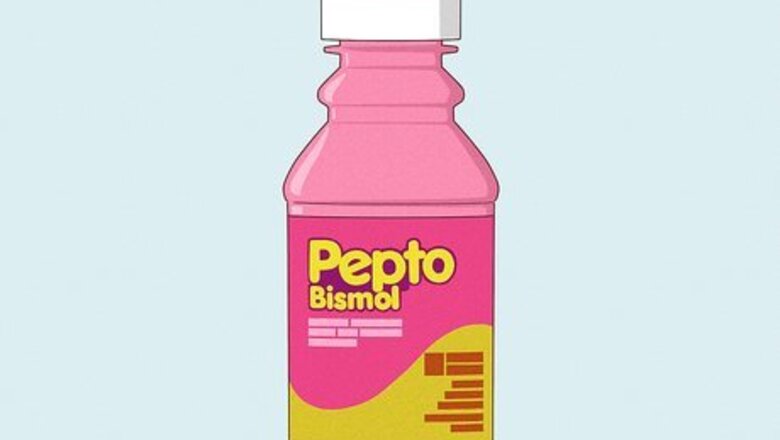
views
- Take Pepto Bismol to alleviate stomach cramps and nausea. Try paracetamol (Tylenol) if you have a fever or body aches.
- Take ibuprofen sparingly, as it can make your stomach hurt worse.
- Drink plenty of fluids and rehydration liquids. Stick to the BRAT diet, and use honey and ginger to soothe your stomach.
- Give yourself plenty of time to rest and recover from food poisoning. Typically, you’ll recover in about 48 hours.
Medication

Relieve nausea and stomach aches with bismuth subsalicylate (Pepto Bismol). You may experience stomach pain during food poisoning. To treat stomach cramps, take a dose of over-the-counter Pepto Bismol. This medicine is made to settle your stomach, and it can also help with nausea, vomiting, and diarrhea. Be sure to follow the dosage instructions on the bottle of Pepto Bismol. Taking too much could make your stomach hurt worse. If you are actively throwing up and can’t hold liquids down, don’t take Pepto Bismol just yet. Focus on holding down fluids first, and then try Pepto Bismol to make you feel better after throwing up.

Reduce a fever with paracetamol (Tylenol). If you have a high fever or body aches, paracetamol may be able to help. Take a 500 mg dose (typically 2 pills) and wait 1 hour for the medicine to work. Keep in mind that if you can’t hold liquids or food down, you may end up vomiting the paracetamol back up. Wait until you can hold down food and liquids before taking medication. Tylenol can sometimes cause liver toxicity, especially in young children. Check in with your child’s pediatrician before giving them Tylenol.

Use ibuprofen sparingly for aches and pains. Pain medicines like these have the potential to upset your stomach even more. If you haven’t thrown up in a couple of hours, go ahead and take a dose of ibuprofen and see how you feel. If your stomach does feel upset afterwards, try to eat a small meal and drink water.

Avoid anti-diarrhea medication. While diarrhea from food poisoning can be inconvenient, it is a mechanism used by the body to quickly expel toxins. Stopping diarrhea with medicine can actually make your stomach hurt worse, so doctors recommend staying away from it while you recover from food poisoning.

Ask your doctor about an antibiotic for bacterial food poisoning. When your food poisoning is caused by bacteria (and not a virus), you may need antibiotics to recover. Make an appointment with your doctor and talk about your symptoms if you are throwing up for more than 3 days. Bacterial food poisoning is often caused by salmonella or Escherichia coli (E. coli). Antibiotics will not help you recover from food poisoning that’s caused by a virus (like norovirus).
Home Care

Drink plenty of liquids and fluids. If you're experiencing frequent vomiting and diarrhea, your body will quickly lose fluids, which will result in dehydration. Drink as much liquid as you can to replace lost fluids. If you find it difficult to drink a lot, take several small sips frequently. Try drinking water, decaffeinated tea, or apple juice diluted with water 50/50. Sipping broth or soup and sucking on ice chips or popsicles is also a good way to get nutrition and fluids. You can also drink sports drinks, like Gatorade or Powerade, to replenish your electrolytes.
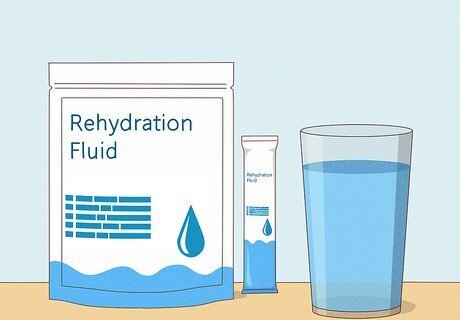
Drink a rehydration fluid. These powders that you mix into water help replace minerals and electrolytes that your body is losing through vomiting and diarrhea. Drink these along with plain water to help your body recover and restore itself. To make your own rehydration fluid, mix 1/2 teaspoon salt, 1/2 teaspoon baking soda, and 4 tablespoons of sugar into 4 1/4 cups (1 liter) of water. Stir until the ingredients are dissolved before drinking. While a rehydration fluid is fine, drinking plain salt water is not a good idea, since it could upset your stomach.
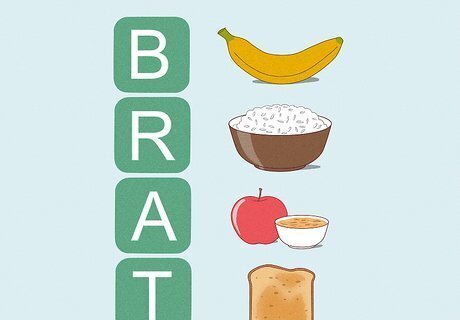
Follow the BRAT diet. Once you're feeling a bit hungry and nausea has subsided, start nibbling BRAT foods: bananas, rice, applesauce, and toast. These foods can calm your stomach and won’t trigger nausea or vomiting. Saltines, mashed potatoes, and soft-cooked vegetables are also gentle on an upset stomach. Remember, don't force yourself to eat or rush into eating too much. If you feel sick, stop eating for now.
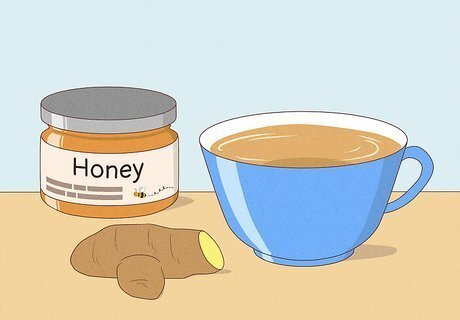
Soothe your stomach with honey and ginger. A mixture of ginger and honey in warm water may help to reduce stomach pain and indigestion. Try making yourself a cup of ginger and honey tea. Brew a few slices of peeled, fresh ginger in hot water, then stir in a tablespoon of honey (or more or less if desired) and sip slowly. Make sure that you never give honey to a child under the age of one. Honey may contain a bacteria that can lead to botulism in infants.
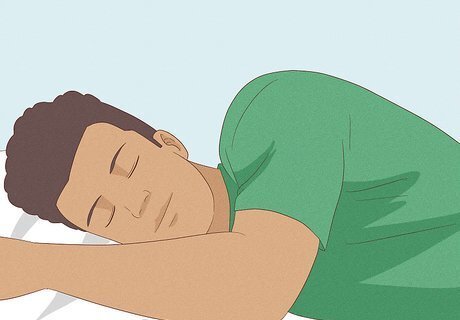
Get plenty of rest. You will likely feel fatigued as your body fights to rid the toxins from your system. Take time off of work or school, and spend as much time in bed as possible. Your body needs rest to recover from food poisoning. Typically, you’ll recover from food poisoning within 48 hours or so. Food poisoning needs to run its course in order for you to recover, so the best thing you can do is wait out your symptoms.
What to Avoid

Take a break from dairy products for a few days. As your body fights against food poisoning, your digestive system will experience a temporary state of lactose intolerance. Because of this, any dairy products that you consume—like butter, milk, cheese, yogurt, etc.—will result in further complications. Avoid consuming dairy until you are sure that your body has returned to normal. It’s likely that dairy won’t sound too appetizing to you, anyway.
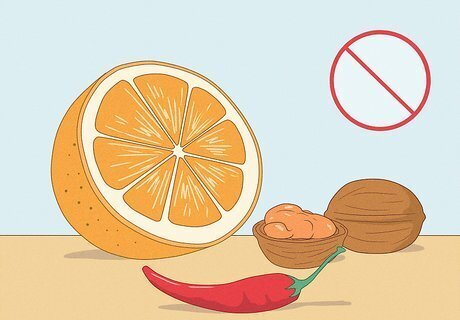
Avoid spicy or fatty foods. Chances are these won't sound appealing if you already have food poisoning, but take care to avoid spicy or fatty foods which can be difficult for you to digest. Cut down on high-fiber foods, like citrus, legumes, whole grains, and nuts, that can be tough on your stomach.

Avoid consuming caffeine and alcohol. Caffeine and alcohol may make you feel worse when you have food poisoning, so it is best to avoid them. They're also diuretics, which means that they will cause you to urinate more often. Frequent urination leads to dehydration, which can cause serious problems when combined with frequent vomiting and diarrhea. Want to sip on a warm drink? Try herbal tea, which doesn’t contain caffeine.

















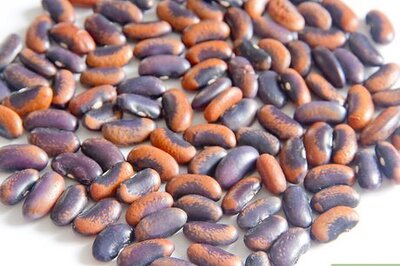
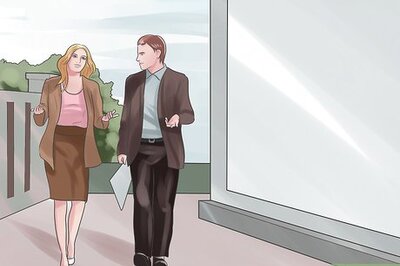

Comments
0 comment